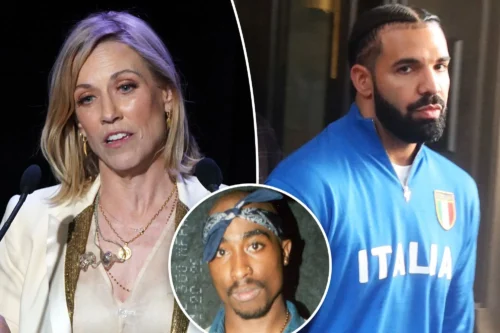American singer-songwriter and actress, Sheryl Crow, voiced her disapproval towards Drake for incorporating an AI-generated voice of Tupac Shakur in a diss track aimed at Kendrick Lamar. Crow, aged 62, criticized the 37-year-old Canadian rapper for using the voice of the late West Coast rapper in his Taylor Made Freestyle, emphasizing that bringing deceased individuals back through technology is disrespectful.
Crow expressed her belief that Drake’s approach of seeking forgiveness after the fact does not justify the unethical use of technology to manipulate and exploit the voices of deceased artists such as Tupac, who passed away on September 13, 1996.
Crow stated, ‘I’m sure Drake thought, “Yeah, I shouldn’t do it, but I’ll say sorry later”. But it’s already done, and people will find it even if he takes it down. It’s hateful. It is antithetical to the life force that exists in all of us.’
Recent controversies surrounding the track emerged as Tupac’s estate threatened legal action against Drake for using the late rapper’s voice without permission in the Kendrick Lamar diss track. The use of artificial intelligence to clone Tupac and Snoop Dogg’s voices in the diss track received strong criticism and led to a cease and desist letter being sent to Drake by Tupac’s estate attorney, Howard King.
The letter demanded the immediate removal of the song, citing it as a ‘flagrant violation of Tupac’s publicity and the estate’s legal rights’ and an exploitation of the legacy of one of hip-hop’s most esteemed artists. Despite the track not being released on mainstream platforms to avoid royalty implications, it gained attention and backlash for disrespecting Tupac’s image and using it carelessly in a song targeting Kendrick Lamar.
The letter expressed, ‘The unauthorized, equally dismaying use of Tupac’s voice against Kendrick Lamar, a good friend to the Estate who has given nothing but respect to Tupac and his legacy publicly and privately, compounds the insult. It is hard to believe that [Tupac’s record label]’s intellectual property was not scraped to create the fake Tupac AI on the Record.’
King’s legal notice urged Drake to disclose how the AI-generated sound-alike was produced and the entities involved in its creation, as it potentially violated publicity rights laws safeguarding individuals’ likenesses. By exploiting Tupac’s voice for commercial gain and disruptive intent, the diss track faced severe backlash for misrepresenting Tupac’s estate and legacy, prompting legal threats and public outcry.



Comment